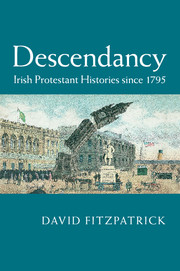Crossref Citations
This Book has been
cited by the following publications. This list is generated based on data provided by Crossref.
2016.
Books Received.
The Journal of Ecclesiastical History,
Vol. 67,
Issue. 2,
p.
462.
Reid, Colin W.
2016.
Citizens of Nowhere: longing, belonging and exile among Irish Protestant writers in Britain,c.1830–1970.
Irish Studies Review,
Vol. 24,
Issue. 3,
p.
255.
Farrell, Sean
2017.
Going to Extremes: Anti-Catholicism and Anti-Slavery in Early Victorian Belfast.
European Romantic Review,
Vol. 28,
Issue. 4,
p.
461.
MORRISSEY, CONOR
2018.
‘ROTTEN PROTESTANTS’: PROTESTANT HOME RULERS AND THE ULSTER LIBERAL ASSOCIATION, 1906–1918.
The Historical Journal,
Vol. 61,
Issue. 3,
p.
743.
Devlin Trew, Johanne
2018.
Rethinking the Irish Diaspora.
p.
15.
Augspurger, Carolyn
2018.
National identity, religion, and Irish unionism: the rhetoric of Irish Presbyterian opposition to Home Rule in 1912.
Irish Political Studies,
Vol. 33,
Issue. 3,
p.
331.
Kelly, James
and
Bartlett, Thomas
2018.
The Cambridge History of Ireland.
Hughes, Brian
2018.
‘Make the terror behind greater than the terror in front’? Internal discipline, forced participation, and the I.R.A., 1919–21.
Irish Historical Studies,
Vol. 42,
Issue. 161,
p.
64.
Morrissey, Conor
2019.
Protestant Nationalists in Ireland, 1900–1923.
Houston, Matthew
2019.
Presbyterianism, unionism, and the Second World War in Northern Ireland: the career of James Little, 1939–46.
Irish Historical Studies,
Vol. 43,
Issue. 164,
p.
252.
Govan, D. H.
2021.
Towards a religious understanding of the Orange Order: Belfast 1910 to 1914.
Irish Studies Review,
Vol. 29,
Issue. 4,
p.
501.
Hughes, Brian
2021.
The disbanded Royal Irish Constabulary and forced migration, 1922–31.
Irish Studies Review,
Vol. 29,
Issue. 2,
p.
212.
O'Donoghue, Martin
2022.
Faith and fatherland? The Ancient Order of Hibernians, northern nationalism and the partition of Ireland.
Irish Historical Studies,
Vol. 46,
Issue. 169,
p.
77.
Moulton, Mo
2024.
Dogs in the picture: restoring the queer history of the Irish family.
The History of the Family,
Vol. 29,
Issue. 1,
p.
84.





